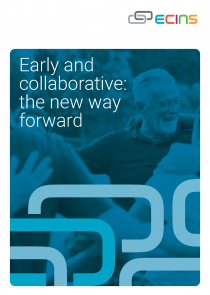An intensive support programme to help the recovery of vulnerable people who commit low level crime is reducing offending levels across Peterborough.
The Integrated Offender Recovery Programme (IROP), thought to be the first of its kind nationally, focuses on helping people with mental health and/or drug and alcohol issues, who are vulnerable and can be exploited, by involving a range of specialist partners who can offer support that tackles the cause of their offending.
The scheme is managed via the secure multi-agency case management system ECINS and steered by a monthly Operational Group chaired by Shelley Ward of Cambridgeshire Constabulary.
‘We started a project three years ago to identify frequent attendees to custody’ said Ward. ‘These people were not long-term criminals but individuals who were trapped in a cycle of low-level crime such as shoplifting. We identified that many of these people were trapped in domestic violence, had mental health, drugs and alcohol issues and were vulnerable to outside influences.
‘Together with cgl, a local Drug and Alcohol Treatment Service in Peterborough we developed IROP, to reduce the re-offending of Frequent Attendees to Police Custody by providing intensive case management support, maximising engagement in supportive interventions that reduce chaotic substance misuse and challenge offending behaviour.‘
Each individual is monitored prior to being adopted onto the scheme, to support evaluation of outcomes and costed for the whole of the criminal history with the Constabulary. This cohort of person is very costly on police budgets and many have not had a formal mental health assessment or a structured intervention plan with wellbeing outcomes. ‘Their offending is low level crime but many of the individuals have had prolonged periods of arrests and some have had police in attendance for hours prior to arrest which can be very draining on police budgets’ said Ward. ‘There are also concerns for the individuals with substance misuse issues or other vulnerabilities who are unable to break the cycle of crime. This could be due to other contributing factors that have not been identified i.e homelessness leading to people becoming reliant on prison custody.’
Through IROP, Peterborough Police are also able to identify people who have no previous offending and offer them direction and support before their life becomes a cycle of crime and reduced wellbeing.
Using the ECINS system the IROP partners that are supporting intervention are able to “file” all the details and assessments for each member of the cohort in one place. This enables the intervention workers to keep close contact with all updates and interventions. Each member of IROP has an assessment using the ECINS wheel assessments to capture what is working well, and if areas of concerns may be arising. Each individual assessment can be “compared”, to support monitoring – closely monitoring the person’s substance misuse, health and engagement.
Using ECINS and the assessment tools allows the intervention team to review the key indicators. This supports evaluation and review that the person is receiving the appropriate management care plan for their individual need.
‘As you can “lock” the viewing platforms on ECINS – this is an excellent tool for keeping information on a need-to-know basis’ said Ward. ‘IROP is all about recovery; persons are invited to be on the scheme, and give consent for partners to work together. The element of trust between the person and their recovery worker is paramount to the recovery, and ECINS provides the platform that allows reports and other information not to be on the front profile page. This is perhaps the most important aspect of the scheme and that is why we use ECINS because it allows us to operate in a secure way.’


